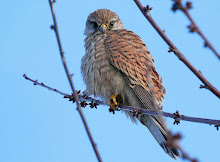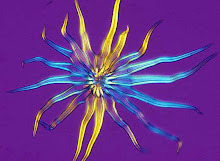Our local fields has been blanketed with snow for almost a fortnight now, with outlines of trees and hedgerows etched into a blank white canvas.... and most of the bird and mammal life is confined to the hedges. We came across this weasel Mustela nivalis yesterday, scampering amongst the snow-covered brambles and willowherb stems along a hedgerow bottom, and I lured it within camera range using a ‘weasel-charming’ trick that a gamekeeper showed me when I was a kid. Stoats and weasels don’t have particularly good eyesight but their hearing is acute and they’ll investigate any noise that sounds like a distressed small mammal. So if you bite your bottom lip and suck air into your mouth through your teeth, they’re overcome with curiosity and will come to see where the squeaky noise is coming from. It works every time and I’ve had stoats come within a yard of me before they realised that the sound was coming from something too big to tackle. This weasel was a little more circumspect, but was only about three yards away when I pressed the shutter button.
Our local frozen landscape


























A lovely wee animal Phil. If the snow hangs around till spring you should see them sparring, always an entertaining spectacle, but difficult to spot them unless it's snowy. Wondered the other day if you were having camera problems as a couple of images were a tad noisy, this is OK though.
ReplyDeleteHow sweet! I love weasels - used to have ferrets as pets. We've got lots of weasels around here, but I never see them. Will have to try your fool-proof trick if I ever see one!
ReplyDeleteAND - curious minds want to know: what is the difference between a weasel and a stoat?
Oh my goodness! I enlarged the photo of the weasel and what a truly beautiful creature it is! I've only ever seen them running from one side of the road to the other in front of the car. :O)
ReplyDeleteI love the photo of the trees. I don't know much about photography..... my skills run to photographing items for eBay. :O) But I like how the bare trees appear black against the Winter sky and the gorgeous dry-stone wall seems to complete the picture.
I'm off now to practice weasel-charming. :D
Great photo and a useful ruse.
ReplyDeleteMy scenery has turned the same as yours overnight - just when the last lot had disappeared!
Hi Adrian,more a problem with the light than the camera; it's an old Nikon D70 and I was using it hand-held with the sensitivity cranked up to the max, so the end result was some pictures that had more coloured dots than a Seurat painting! I'm trying to justify spending some money to get a camera that's a bit more up-to-date, especially wrt to noise reduction but the old one has so far been very reliable, even though it's carried around in the bottom of an old rucksack. Just come in from walking in a minor blizzard and now need to dry off the camera..... if it hasn't survived that, it will give me the excuse I need to indulge in some better equipment...
ReplyDeleteHi Ellen, thanks for dropping by. Stoats (the European ones, anyway) are substantially larger than a weasel and have longer, black-tipped tails. Stoats can develop white fur (ermine) in winter, although our winters in Durham generally aren't cold enough - I've only seen one stoat in ermine in the last 35 years around here.
ReplyDeleteI know what you mean about weasels dashing across roads in front of cars, Lesley... with those short legs it's sometimes touch-and-go whether they'll make it...and, as you say, winter is a great time for appreciating the silhouettes of trees; the ones in the photo are sycamores..
ReplyDeleteWe had a lot more snow last night too, John, and it's brought a lot more birds into the garden.... costing me a fortune in bird food!
ReplyDeleteLove the weasel and all the snowy landscape shots. It looks quite magical.
ReplyDeleteLovely shot of the Weasel in the snow Phil.
ReplyDeleteI wish I knew that little trick the other week for the Stoat lol
Like that last shot of the trees too.
All the best for the New Year.
Hi Wilma, it certainly transforms the landscape from a watercolour into a pen-and-ink drawing...
ReplyDeleteHi Keith, the gamekeeper who told me about it was more interested in killing them than photographing them, but I've found it a really useful trick..
ReplyDeleteAh-ha! I looked up Mustela nivalis and it turns out that here (N. America) that is the least weasel, which is more northerly than where I am (Adirondack Mts. of NY - near Canada). Here we have short-tailed (M. erminea, aka: ermine) and long-tailed (M. frenata); these must be your stoats. Both turn white in winter and have black-tipped tails year-round. The least weasel turns white in winter, too, but it's tail isn't black-tipped. So - at last a mystery solved! Thanks.
ReplyDeleteA lovely set of photos
ReplyDeleteHi Ellen,We have a lot of stoats and weasels hereabouts. The stoats have thrived as the rabbit population has increased.
ReplyDeleteThanks Alan, We have another heavy fall of snow overnight, so I've got a lot of digging to do!
ReplyDeleteHi. If anyone out there has a female least weasel around a month old (as of June 2011) please let me know if I could have it as a companion for a male who will never be able to be released due to permanent disablement and thus will either have to be put to sleep (the vet's advice) or live out his life as a pet. We have decided on the latter but if there's a female out there in a similar position they could be company for each other. I know they can fight once adult so will only do it if we can introduce one now.
ReplyDeleteObviously it would only be fair to make a pet of another one who could never cope if released; not looking to catch one or anything. :)
thanks,